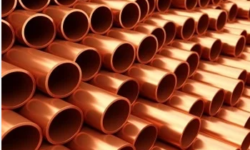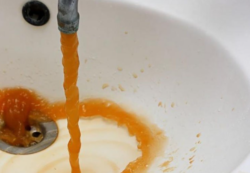Copper is used extensively for numerous purposes, perhaps most notably for pipes.
Why is copper such a popular choice for piping?
Firstly, copper is resilient to cracks or splits and is highly durable, meaning it can potentially last for many decades. It is the perfect material for underground installations because it is corrosion-resistant. Any dangerous substances in the surrounding ground, such as lead or petroleum, are unable to permeate copper pipes.
Copper is fire resistant, can be fairly easily recycled or reused, making it a sustainable choice, and copper pipes are relatively easy to install.

What are the types of copper pipe and how long do they last?
Most copper pipes are Type M, Type L or Type K.
M-type pipes are the cheapest and thinnest and are often used in residential settings. They are officially supposed to last approximately 50 years, but because they are often exposed to acidic water, they may not always last this long.
L-type pipes are thicker and more durable than M-types. They are much more likely to last 50 or more years and are better able to deal with acidic water. Although they are more expensive, some people will opt for them for greater peace of mind.
K-Type copper pipes can last 100 years or more. Because they are the thickest and most expensive, they are usually reserved for use in city water mains and industrial plumbing systems rather than residential settings. They are very strong and able to withstand high pressure.
Expert advice
If you are looking for options in terms of copper piping or copper pipe fittings, a specialist such as Watkins and Powis can offer advice and guidance.
Is copper piping affordable and safe for residential use?
Although it is more expensive than plastic, copper piping is by no means unaffordable, costing an average of £3.50 per metre for 15mm diameter piping.

When it comes to safety, copper piping is considerably better than other options for carrying drinking water. Copper has antimicrobial properties and can even reduce the amount of lead in the water.
